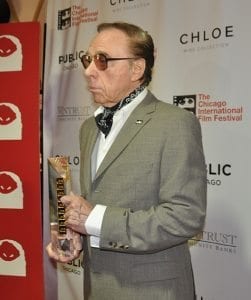Film Legend Bogdanovich Talks About His Career At Chicago Film Fest
 Continuing my coverage of the Chicago International Film Festival this week, I had the opportunity to interview a legend of the silver screen over the past five decades, Peter Bogdanovich, auteur of such films as Paper Moon, Last Picture Show and What’s Up Doc?
Continuing my coverage of the Chicago International Film Festival this week, I had the opportunity to interview a legend of the silver screen over the past five decades, Peter Bogdanovich, auteur of such films as Paper Moon, Last Picture Show and What’s Up Doc?
“One Day Since Yesterday:” A Documentary About the Work of Peter Bogdanovich, debuts this week at the Chicago International Film Festival.
The documentary “One Day Since Yesterday” was directed by Miami native Bill Teck and produced by Victor Brazo and focuses on Peter Bogdanovich’s film “They All Laughed.” This was the film that Dorothy Stratten, Bogdanovich’s paramour, was cast in, playing one of two romantic couples (opposite John Ritter), with Audrey Hepburn and Ben Gazarra playing the older couple. Said Teck of Bogdanovich, “I never met a more brave human being. He gave us unprecedented access to everything.”
Keck explained his fascination with Bogdanovich’s film work this way: “When I was 13 I went to the Art Theater in Miami and saw ‘They All Laughed.’ My movie is about that movie. I don’t know that anyone else embodies old Hollywood combined with the new more than Peter Bogdanovich. ‘They All Laughed’ is a valentine to love: love of his art, movie love and true love. I call it ‘The Lost American Film’ because it was Audrey Hepburn’s last film role, co-starred John Ritter and Ben Gazzarra and, of course, Dorothy Stratten.”
Following the showing of the film, Bogdanovich commented on directing Audrey Hepburn in her final film.
Q: Why did Hepburn take the role?
A: “I think she did it because I told Audrey that Sean, her son, could be my assistant. But she was paid $1 million for 6 weeks’ work.” Said Bogdanovich of Hepburn: “She was very apprehensive, very shy, sensitive. In front of the camera, however, she had a steel-like intensity; it was all there. We had a limited budget for this movie. We couldn’t shut down 5th Avenue, so all the trailers and trucks were blocks away. She had no trailer. No chair. No dressing room. She was great. She was just great. She’d go inside the store and we’d use hand signals to let her know when we needed her to come out for shooting a scene and she’d come out and say, “Oh, look, Peter. They gave me this lovely umbrella.” (mimicking Hepburn’s accent)”
Q: Ben Gazarra plays Hepburn’s love interest in the film, and documentary director Keck was fortunate enough to be able to record Gazarra’s last interview about making both this film and Saint Jack with Bogdanovich. (Another interesting coincidence: Bogdanovich also was the director who helmed River Phoenix’s last film, “The Thing Called Love” in 1993.)
Tabloids buzzed after the brutal murder of Playmate of the Year Dorothy Stratten by her estranged husband/manager Paul Snider, who then committed suicide. The murder, in 1981, sent Bogdanovich into a tailspin from which he seems never to have fully recovered. His marriage to Dorothy’s younger sister Louise in 1988, when he was 49 and she was 20, did nothing to cause the memory of the brutal murder to recede into the past for the public nor, it would seem, for the private person to fully recover.
In fact, both with his master plan to buy back the film from the studio and distribute it himself through a distribution group he dubbed Moon Pictures, his actions since 1981 seem to have produced a long period of grieving for what he has lost in life. Descriptions of how distraught Bogdanovich was after Dorothy’s murder include his daughters testifying that he couldn’t walk, but crawled to them. Ex-wife Polly Platt, mother of his children, thought that writing The Killing of the Unicorn: Dorothy Stratten 1960-1980 was probably good therapy for Peter at the time. Perhaps it was, but it doesn’t seem to have worked that well.
His daughters remember August 14, 1980 as “the day we lost our father.”
 Bogdanovich discussed the Bob Fosse-directed picture “Star 80,” which featured Eric Roberts as Snider and Mariel Hemingway as Dorothy. When the film came out, Bogdanovich called up Bob Fosse, its director, whom he knew personally. “‘Why are you doing this, Bob?’ I asked him. Fosse said, ‘We think it’s a good story.’ It was his last picture. It killed him. All I know is that if this had happened to Bob, I wouldn’t have made a film about it.”
Bogdanovich discussed the Bob Fosse-directed picture “Star 80,” which featured Eric Roberts as Snider and Mariel Hemingway as Dorothy. When the film came out, Bogdanovich called up Bob Fosse, its director, whom he knew personally. “‘Why are you doing this, Bob?’ I asked him. Fosse said, ‘We think it’s a good story.’ It was his last picture. It killed him. All I know is that if this had happened to Bob, I wouldn’t have made a film about it.”
Bogdanovich was forced to declare bankruptcy in 1985 and again in 1997. The bankruptcy of ’85 was caused by his rash decision to buy back Stratten’s film “They All Laughed” (mortgaging his house to do it) from the studio and to try to distribute it himself. “We had no clout,” he said. (According to Wikipedia, at the time, he had income of $75,000 a month and expenses of $200,000 a month). “That was dumb,” he said during the Sunday event, of his attempt to self-distribute. Had it been a big success, however, he might have revolutionized the industry.
More studio problems presented themselves when he helmed “Mask” in 1985 and became embroiled in a dispute with the studio over the replacement of Bruce Springsteen’s songs in the film with songs written by Bob Seger.
Whatever ups and downs Bogdanovich’s career and personal life have had, his 3 hits in a row (“The Last Picture Show,”1971, “What’s Up, Doc” in 1972, and “Paper Moon” in 1973) alone will forever cement his reputation as once being among the best of the best.
His extensive writing about film, preserving the wisdom of previous great directors whom he personally knew and interviewed, also justifies awards like the Gold Hugo Lifetime Achievement Award, bestowed upon him in Chicago this night.









